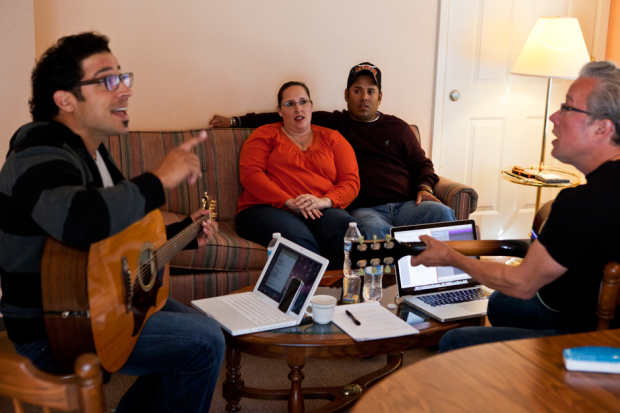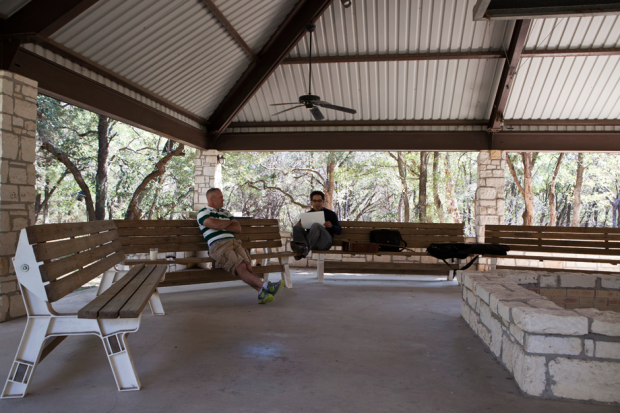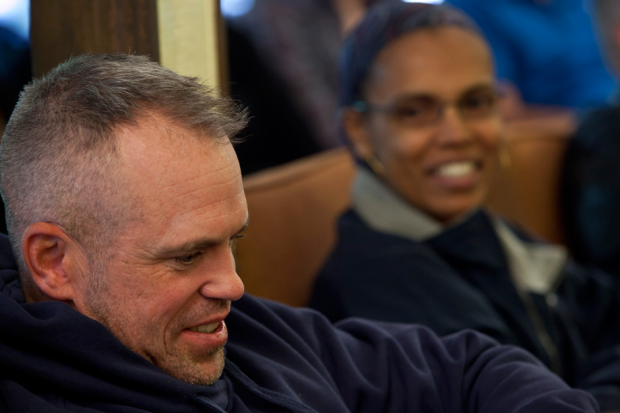Smith and Salim-Shirazy collaborate on a delicate but steely fingerpicked ballad called “Why Not Me?” It’s about being a Muslim and a woman serving in a military that hasn’t always embraced either of those identities. Clementi and Foster work with Obregon and his wife Kim, herself a military vet, on “Calling Home,” an extraordinary country tearjerker that’s practically begging to be recorded by Brad Paisley or Kenny Chesney. I watch Foster employ what he called his “ranch-hand Spanish” to draw Santiago out of his shell and talk tearfully about witnessing a friend get gunned down in Iraq. They then channel that hurt into a Spanglish lament titled “Me Perdi.”
The process of co-writing songs with people who don’t consider themselves writers is a skill, and something Foster believes he’s gotten better at as he’s done more of it.
“My job as a songwriter is to go cracking my own soul open, so you have to switch gears because you’re used to doing it for yourself,” says Foster, whose soothing voice and fatherly warmth seems to put his co-writers immediately at ease. “I realized you have to be willing to share a part of your life with these guys, yet it always has to be about them.”
:audio=2:
In some cases, the soldiers’ contributions amount to simply talking and then having their words rearranged, edited down, and augmented into rhyming couplets. Other times, it feels more like the give-and-take you’d expect to see in any songwriting session. One morning, I sit with Smith and McRae in a corner of the lodge as they work on a song called “Losing the Dream.”
Previously, during the songwriting session on the first night of the weekend, McRae mostly had been sitting stone-faced, not exactly resistant to the entire exercise, but definitely skeptical. He seems almost like a different person this morning, though, leaning back, sipping on a cup of coffee, quick with a smile or an anecdote. McRae was part of the initial ground invasion of Iraq in 2003, then did two tours in Afghanistan, as well as a stint as a National Guardsman in New Orleans after Katrina, which he says may have been more distressing than anything he saw overseas. After an IED attack in Afghanistan in 2010, he was medevacked to Walter Reed Medical Center in Bethesda, Maryland, and diagnosed with TBI, but says he traces his PTSD not to any specific incident.
“Even though I was a rough and tumble guy, seeing people killed and mauled and all that really tweaks what you think the world is really all about,” he says. “One of my biggest problems is once it’s over, I stop thinking about it and try to move on to something else. What I’m realizing in my own life is that if you don’t deal with these things, they don’t go away. My mom has a great saying, ‘If you keep stuffing shit in the closet, eventually you’re not going to be able to shut the door.'”
Back home between deployments, McRae starting drinking a lot, his marriage disintegrated, and his wife left with his kids. The song he’s writing with Smith is an attempt to chronicle his slide into that abyss and his recent success at beginning to climb back out.
Smith bangs out a bluesy, energetic refrain on his guitar and sings a line they’re working on from the song’s bridge: “I got dark and I hit bottom / And now I see brighter days.” He keeps strumming, and bobbing his head, but looks to the ground as if he’s searching there for the next line. McRae jumps in.
“With your rhythm, it’s something like, ‘I finally see I can change my ways,” he says. “Or something like that.”
Smith nods and returns to the song.
“I got dark and I hit bottom / I saw I had to change my ways/ Talk about nightmares, brother, I’ve got ’em / And now I see brighter days.”
McRae smiles. “Umm-hmm.” He stands and picks up his cup. “Want some more coffee?”
Smith shakes his head frantically. “No, don’t leave, don’t leave.” He sings the bridge again, which leads back into the chorus: “I’m losing that dream / Losing that dream/ That’s been chasing me.”
McRae sits back down. “Or, ‘That I always believed,'” he says.
Smith practically leaps off the couch.
“Ahhh! Fuckin’ awesome! Fucking awesome! Now, you’ve got it. It’s not rocket science. You don’t need me!”
McRae laughs. “Those that know me would never believe I hung out with you artsy-fartsy guys.”
:audio=3:








